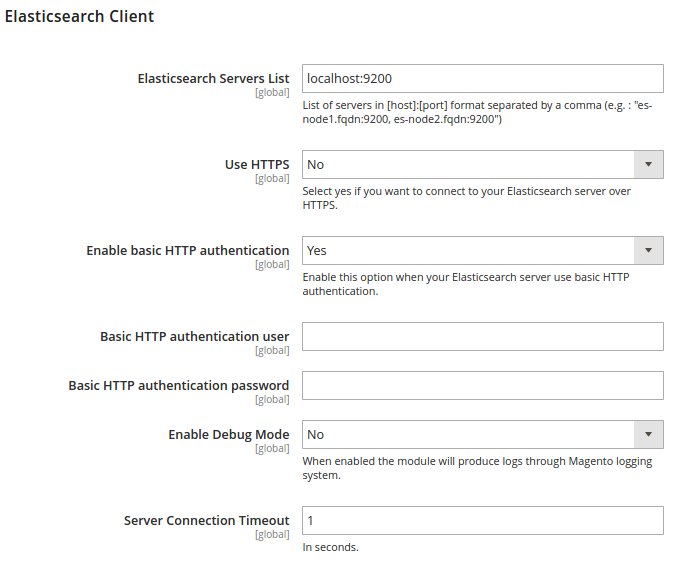-
Notifications
You must be signed in to change notification settings - Fork 342
ModuleInstallOld
-
⚠️ Deprecated documentation :- This documentation is suitable if you install old version of ElasticSuite. If you are using ElasticSuite >= 2.5.0, please refer to the new documentation page
-
⚠️ ElasticSearch 5.x is not on older version of ElasticSuite. Please upgrade to ElasticSuite 2.5.0 if you want to use ElasticSearch 5.x
- ElasticSearch 2.1 or higher with :
- Enabled scripting
- ICU and Phonetic plugin installed
- Depending the version of ElasticSuite :
| ElasticSuite Version | Magento required version |
|---|---|
| ElasticSuite 2.0.x | Magento 2.0.x |
| ElasticSuite 2.1.x | Magento 2.0.x |
| ElasticSuite 2.2.x | Magento 2.1.x |
| ElasticSuite 2.3.x | Magento 2.1.x |
| ElasticSuite 2.4.x | Magento 2.2.x |
In order to get a properly set up ElasticSearch server you should read the following page of the wiki ElasticSearch server configuration
composer require smile/elasticsuitebin/magento module:enable Smile_ElasticsuiteCore Smile_ElasticsuiteCatalog Smile_ElasticsuiteSwatches Smile_ElasticsuiteCatalogRule Smile_ElasticsuiteVirtualCategory Smile_ElasticsuiteThesaurus Smile_ElasticsuiteCatalogOptimizer Smile_ElasticsuiteTracker
bin/magento setup:upgradeYou can configure your ElasticSearch server via Stores > Configuration > Smile Elastic Suite > Base Settings

| Parameter | Default value | Description |
|---|---|---|
| ElasticSearch servers list | localhost:9200 | This a comma-separated list of servers in the [host]:[port] format where you should indicate all your ElasticSearch nodes. E.g. : "es-node1.fqdn:9200, es-node2.fqdn:9200". |
| Use HTTPS | No | Enable this parameter if you want to access to your Elasticsearch server through https. |
| Enable basic HTTP authentication | No | Enable this one if your Elasticsearch server uses basic HTTP authentication |
| Basic HTTP authentication user | empty | If you are using HTTP authentication, set your user auth in this field. |
| Basic HTTP authentication password | empty | If you are using HTTP authentication, set your user password in this field. |
| Enable debug mode | No | When this parameter is set to "Yes", the module produces logs through the Magento logging system. |
| Server connection timeout | 1 | In seconds, the default timeout used when querying the server. |

| Parameter | Default value | Description |
|---|---|---|
| Indices alias name | magento2 | The default alias put by the module on Magento's related indices. An alias per store and entity type will be generated with the following format : [indices_alias_name]_[store_code]_[entity_type]. E.g. : magento2_default_catalog_product. |
| Indices name pattern | {{YYYYMMdd}}_{{HHmmss}} | The horodated pattern used when creating new index. An index name per store and entity type, based on the horodated pattern, will be generated with the following format : [indices_alias_name]_[store_code]_[entity_type]_[horodated_pattern]. The E.g. : magento2_default_catalog_product_20160304_094708. |
| Number of shards per index | 1 | The number of shards per index. A shard is a single Lucene instance and they are distributed by ElasticSearch amongst all nodes in the cluster. You can see the Shard definition on the ElasticSearch glossary for more informations. |
| Number of replicas per index | 0 | The number of replicas shards per index. Main purposes of replica shards is for failover : if the node holding a primary shard dies, a replica is promoted to the role of primary. You can read more about Replica Shards on the ElasticSearch documentation. |
You can configure Magento to use Smile ElasticSuite as search engine via Stores > Configuration > Catalog > Catalog Search

| Parameter | Default value | Description |
|---|---|---|
| Minimal Query Length | 1 | The minimal search query length to be processed by the engine. |
| Maximum Query Length | 128 | The maximum search query length to be processed by the engine. |
| Search Engine | MySQL | The default Search Engine used by Magento. Set it to Smile ElasticSuite to use it as Search Engine. |
Once you have completed the 2 previous points, you can process a full reindexing of the catalogsearch_fulltext index.
bin/magento index:reindex catalogsearch_fulltext
bin/magento index:reindex elasticsuite_categories_fulltext
bin/magento index:reindex elasticsuite_thesaurusOnce the reindex is done, you are all set and can view your frontend catalog and search pages being rendered via Smile Elastic Suite !
localhost:9200 you do not need to follow this step.
Your ElasticSearch server may be on a different host than localhost:9200. This typically occurs on a production environment where the ElasticSearch instance should be on a dedicated server.
To ensure the module will properly find your instance when installing, you may have a to add a MyProject_ElasticSuite module in your own project (into app/code) with the following content into the etc/config.xml file :
<config xmlns:xsi="http://www.w3.org/2001/XMLSchema-instance" xsi:noNamespaceSchemaLocation="urn:magento:module:Magento_Store:etc/config.xsd">
<default>
<smile_elasticsuite_core_base_settings>
<es_client>
<servers>my_server:9200</servers>
</es_client>
</smile_elasticsuite_core_base_settings>
</default>
</config>Warning : if you want to be sure that configuration will be loaded in the right order and the new configuration will apply, your custom module should depends Smile_ElasticsuiteCore :
<?xml version="1.0"?>
<config xmlns:xsi="http://www.w3.org/2001/XMLSchema-instance" xsi:noNamespaceSchemaLocation="urn:magento:framework:Module/etc/module.xsd">
<module name="MyProject_ElasticSuite" setup_version="1.0.0">
<sequence>
<module name="Smile_ElasticsuiteCore"/>
</sequence>
</module>
</config>
-
User's Guide
-
Developer's Guide
-
Releases
- Magento 2.3.x
- Magento 2.2.x
- Magento 2.1.x
- ElasticSuite 2.5.15
- ElasticSuite 2.5.14
- ElasticSuite 2.5.13
- ElasticSuite 2.5.12
- ElasticSuite 2.5.11
- ElasticSuite 2.5.10
- ElasticSuite 2.5.9
- ElasticSuite 2.5.8
- ElasticSuite 2.5.7
- ElasticSuite 2.5.6
- ElasticSuite 2.5.5
- ElasticSuite 2.5.4
- ElasticSuite 2.5.3
- ElasticSuite 2.5.2
- ElasticSuite 2.5.1
- ElasticSuite 2.5.0
- ElasticSuite 2.4.6
- ElasticSuite 2.4.5
- ElasticSuite 2.4.4
- ElasticSuite 2.4.3
- ElasticSuite 2.4.2
- ElasticSuite 2.4.1
- ElasticSuite 2.4.0
- ElasticSuite 2.3.10
- ElasticSuite 2.3.9
- ElasticSuite 2.3.8
- ElasticSuite 2.3.7
- ElasticSuite 2.3.6
- ElasticSuite 2.3.5
- ElasticSuite 2.3.4
- ElasticSuite 2.3.3
- ElasticSuite 2.3.2
- ElasticSuite 2.3.1
- ElasticSuite 2.3.0
- Magento 2.0.x